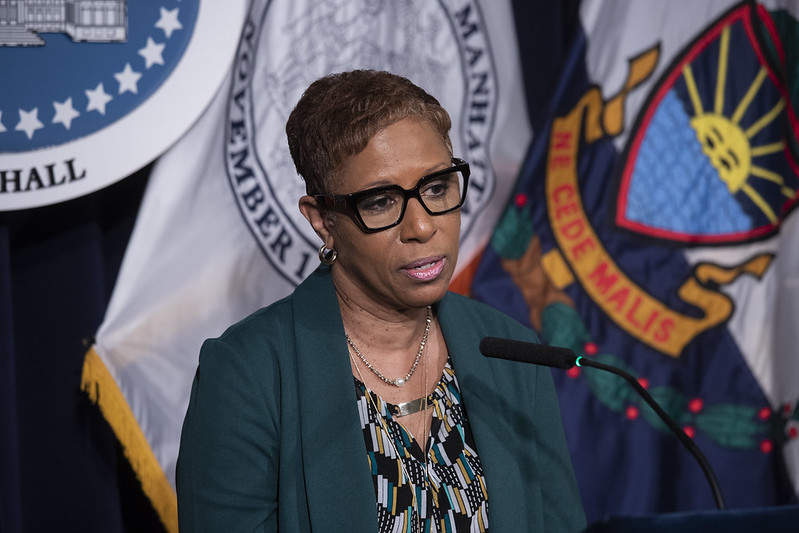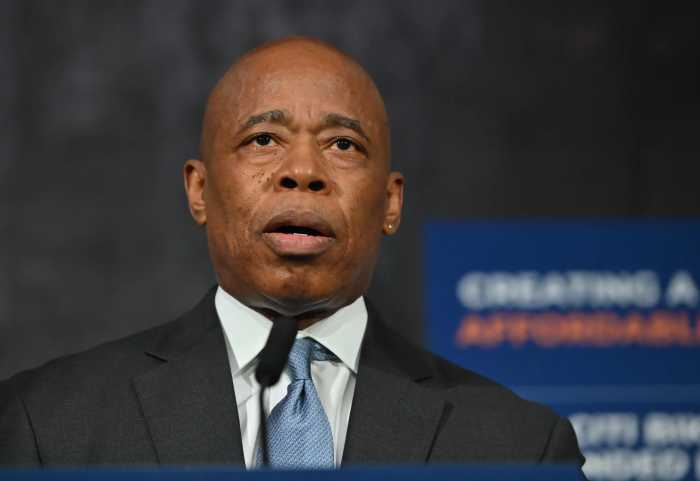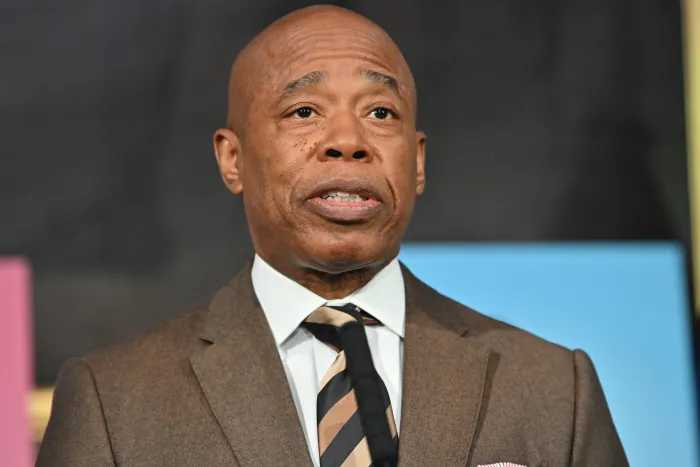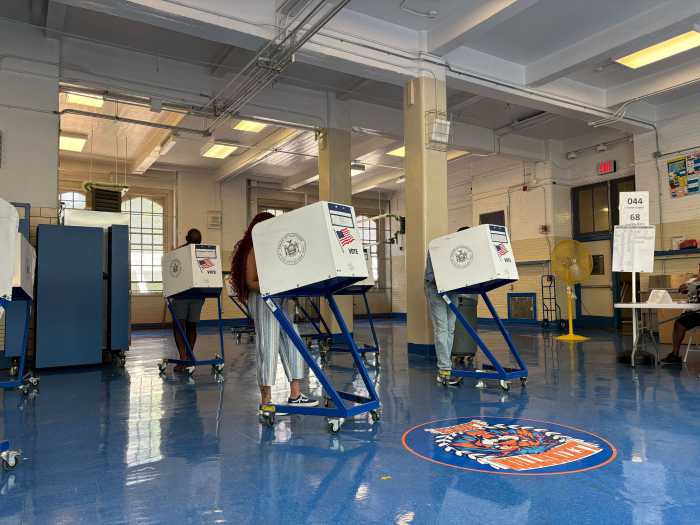City Council Speaker Adrienne Adams on Thursday formally introduced a measure that would subject more mayoral appointees to council approval — but a Charter Revision Commission Mayor Eric Adams formed earlier this week could stand in the bill’s way.
The tiff over the measure — known as “advice and consent” — is the latest in a growing list of disputes between the two sides of City Hall. The speaker and the mayor have also clashed over the city budget, a package of laws expanding housing voucher access and the NYPD’s use of social media to attack its critics.
Speaker Adams, during a Thursday afternoon press conference, stopped short of suggesting the commission was formed specifically to block her legislation, but said the timing was “convenient.”
Council Spokesperson Mara Davis, in a Wednesday night statement, more directly tied the commission to the bill — saying it should be “a serious undertaking, not something arbitrarily constructed in response to a Council bill being introduced and announced at 6 pm with serious ethical questions about some of its members.”
City Hall, however, disputes the contention that the commission is intended to obstruct the legislation, insisting it was formed in response to community concerns about how the council has handled public safety legislation.
Deputy Mayor for Communications Fabien Levy responded to Davis in a statement saying she is “just flat-out wrong.”
“The Charter Revision Commission has been a long time in the making. After a group of working-class New Yorkers came to us and laid out many of the problems they saw with city government, we took their meeting and subsequently started to form our Charter Revision Commission,” Levy said. “Anyone saying otherwise doesn’t know what they are talking about and is simply discounting the opinions of the people they were put in place to represent.”
The mayor did say earlier this week that he does not agree with the proposal and that he likes the current concentration of power in the executive branch becasue “people should know who they blame if the streets are not clean, if the commissioners are not delivering.”
Advise and consent
The bill would significantly expand the council’s say over mayoral appointments, by giving them approval power over an additional 21 agency commissioner posts. Those include heads of the Department of Buildings, Administration for Children’s Services, Department of Health and Mental Hygiene, Department of Social Services and the Department of Housing Preservation and Development.
The list notably does not include the NYPD, FDNY or Department of Corrections commissioners.
Currently, the council only has approval power over a limited list of appointments, including the Department of Investigation commissioner and corporation counsel — who leads the city’s Law Department.
Under the bill, the mayor is required to make a nomination to fill a vacancy at any of the included agencies within 60 days and the council would have to hold a hearing on that nomination within 30 days of its first stated meeting after receiving the selection. If the City Council does not act within that window, the nomination is automatically confirmed.
The speaker said she has long advocated for expanding advice and consent, emphasizing the measure is about “good government and effective governing.”
“We don’t advance legislation based on the current or any one executive, but rather what’s believed to be in the best interest of the city of New Yorkers,” she added. “We think it’s an important conversation to have. Commissioners serve the city and all New Yorkers, not a single official. And all of us do.”
A policy memo on the bill prepared by the council, which was obtained by amNewYork Metro, said the measure is also aimed at making it more difficult for the mayor to place unqualified patronage appointees in key positions by subjecting them to more public scrutiny.
However, the mayor announced the formation of the Charter Revision Commission on Tuesday night, a week after reports of the council bill first surfaced, and announced its 13 members Wednesday night. The commission is charged with reviewing the City Charter to make city government more “responsive and transparent” to New Yorkers.
What the commission would do
Some see the commission’s formation as an attempt to block the council bill because the legislation must be approved via a ballot referendum, and if the panel suggests its own ballot questions, the legislation will not be able to go before voters at the same time.
According to the policy memo, the referendum could be submitted for a special election after the November general, if it is delayed by the commission.
Critics specifically took aim at the mayor for filling the 13 commission posts with many of his closest allies.
Those include its chair Carlo Scissura, who is president and CEO of the New York Buildings Congress; vice chair Hazel Dukes, who heads the New York chapter of the NAACP; former Bronx President Ruben Diaz Jr., who now works as a lobbyist; former first Deputy Mayor Lorraine Grillo; and Rev. Herbert Daughtry, a longtime mentor of his.
But Politico New York reported on several documents Levy shared with the outlet on Thursday in an effort to prove that the commission was long in the works and not quickly formed in response to the council legislation. The documents were also obtained and reviewed by amNewYork Metro.
Levy told Politico the documents show that the commission was formed after suggestions to do so from a group of community advocates, including public safety activist Jackie Rowe-Adams and education lobbyist and Little Africa News publisher Mona Davids. Rowe-Adams and Davids argued, in a May 2 meeting with the mayor, that the commission was needed to review the City Charter to ensure more community input on bills like the controversial How Many Stops Act police reporting bill.
In response to the notion that the commission was formed over a perceived lack of public input on How Many Stops, the speaker pointed out that the council already holds hours-long public hearings on all of its legislation.
“That is the precise intention of every single New York City Council hearing, to bring about the opinions of the public, be it in person, be it virtually, for how many hours it takes us to sit in chambers to listen to everyone that has an opinion,” the speaker said. “So, it’s kind of baffling that the thought would be that the public would not ever be engaged in anything, How Many Stops or anything else, because that is the precise intention of oversight.”
Read More: https://www.amny.com/politics/




































